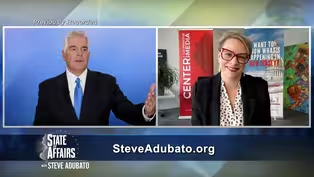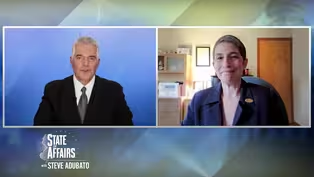State of Affairs with Steve Adubato
Technological advancement in medicine & training physicians
Clip: Season 9 Episode 16 | 8m 10sVideo has Closed Captions
Technological advancement in medicine & training physicians
Steve Adubato sits down with Marc Klapholz, MD, MBA, Chair of the Department of Medicine at Rutgers New Jersey Medical School and Chief of Medical Service at University Hospital, to discuss his passion for medicine, new technological advancements, and his role in training the next generation of doctors.
Problems playing video? | Closed Captioning Feedback
Problems playing video? | Closed Captioning Feedback
State of Affairs with Steve Adubato is a local public television program presented by NJ PBS
State of Affairs with Steve Adubato
Technological advancement in medicine & training physicians
Clip: Season 9 Episode 16 | 8m 10sVideo has Closed Captions
Steve Adubato sits down with Marc Klapholz, MD, MBA, Chair of the Department of Medicine at Rutgers New Jersey Medical School and Chief of Medical Service at University Hospital, to discuss his passion for medicine, new technological advancements, and his role in training the next generation of doctors.
Problems playing video? | Closed Captioning Feedback
How to Watch State of Affairs with Steve Adubato
State of Affairs with Steve Adubato is available to stream on pbs.org and the free PBS App, available on iPhone, Apple TV, Android TV, Android smartphones, Amazon Fire TV, Amazon Fire Tablet, Roku, Samsung Smart TV, and Vizio.
Providing Support for PBS.org
Learn Moreabout PBS online sponsorship[INSPRATIONAL MUSIC STING] - We're now joined by Dr. Mark Klapholz, who is Chair of the Department of Medicine at Rutgers New Jersey Medical School and the Chief of Medical Service at University Hospital.
Doctor, great to have you with us.
Thank you.
- Thank you so much.
Great to be here.
- You got it.
This is part of our "Tomorrow's Physicians" initiative and I wanna also make it clear that recently I hosted, co-hosted the EJI Excellence in Medicine Awards, and you were in fact the winner of the Physician Award.
What'd that mean to you?
- It meant a lot.
You know, the EJI Foundation's done so much for healthcare in New Jersey by supporting the training and education of the next generation of physicians, by supporting people who have really done a lot for health in New Jersey and community service for the various communities and populations of our state.
- Along those lines, doctor, talk about your work in supporting and helping medical students be prepared for the challenges of medicine in 2025 and beyond.
- Well, we have a really robust curriculum here at New Jersey Medical School, recognizing the great advances in technology and great advances in healthcare.
And we incorporate that into their training every day by teaching them and training them the new procedures, new knowledge in healthcare.
Being very mindful in the current era, for example, of AI that is having a big impact.
- You're a cardiology researcher for over 20 years.
You've made a huge difference in your area of expertise with the patients you serve.
Who or what motivated you to become a physician?
- Oh gosh, yeah.
My grandfather was my inspiration to become a physician and he was always my north star.
He was a refugee actually in this country.
- From Czechoslovakia?
- That is correct.
He came here in the late 1940s after World War II.
He spent, unfortunately, years in one of the more notorious Nazi concentration camps, but he was a human being who cherished and respected all people.
He really always looked for that common humanity that exists among all of us.
And in medicine, he really saw the opportunity to deliver on our common humanity by you know, healing the sick.
It doesn't matter, your race, religion, color, creed, and I think that was just a great inspiration for me.
And then, you know, I'm eternally grateful to him for that.
- Along those lines... Post-COVID five plus years after, what does it take?
And I think everyone's story is different.
Everyone's experience is different, doctor, but I've got to imagine that seeing what people saw, young people saw, who make the decision to go into medicine.
I mean, it's an extraordinary commitment.
What kinds of things do you see and experience driving medical students today?
- Well, I think, you know, that bringing in COVID around this, I think is at a very important point.
COVID showed us, you know, unfortunately in many cases how vulnerable we are to things that are out of our control.
But also, it really highlighted what we can do when we stand together and the advances that were brought to the table in incredibly fast speed.
And then, the impact that you can have on really helping people, preventing death, improving long-term outcomes.
I think really it was a very double-edged kind of, you know, so to speak, as they say.
But creates a great inspiration for what you can do to help other people.
- Talk about, again, your area of research is so interesting.
You've done work in the area of nephrology?
- Well, the heart failure's cardiology.
- Okay, but connect...
There's some medical jargon that I don't understand.
Tell me, tell us what this is.
The Internal Medicine Nephrology Pathway pilot program.
What the heck is it?
- Oh gosh, yes.
So, thank you for bringing that up.
That's something we're very proud of.
You know, in the whole graduate medical education arena where we train residents and fellows, to train the next generation of doctors, one of the things that we are... One of the pilot programs in the country is something through the national graduate medical education programs called Advances in Innovation in Residency Education, where we are able to bring people on board, trainees, and have them train in general medicine and a specialty in a shorter period of time.
So, folks can come and in four years they can be trained in internal medicine and in nephrology, which is to take care of kidney disease.
And the value-added proposition of that is there is a shortage in this country, for example, of nephrologists, of kidney doctors.
There's a shortage of infectious disease doctors.
And so, through partnerships with the, what's called the ACGME, which is a national organization, we are able to combine programs and train people more efficiently and effectively.
And we're very excited.
And again, one of the pilot programs in the country.
- Please go on our website, steveadubato.org.
It's up right now.
Look at past episodes we've done connected to this initiative, "Tomorrow's Physicians."
Real quick before I let you go, doctor.
The economics of medical school.
Incredibly challenging, which is challenging, which is why the EJI Excellence in Medicine Awards, the fact that those scholarships are given out every year to some of the best medical students in the state, that matters, doesn't it?
- Enormously, enormously.
It remains a huge challenge.
Medical education is extremely expensive.
Hundreds of thousands of dollars during the course of the four years.
Every little bit helps.
These scholarships are enormously important to enable the most promising to be able to achieve a medical education.
I can't thank enough or recognize enough the EJI Foundation, what they have done.
- Yeah, and people think, well, that's just about those going into medicine.
No, it's for all of us.
(laughs) It's for all of us.
Dr. Mark Klapholz, who is not only a clinician position, but also an MBA.
In his spare time, he got a Master's in Business Administration.
Chair of the Department of Medicine at Rutgers New Jersey Medical School and the Chief of Medical Service at University Hospital.
Doctor, thank you so much for joining us.
We appreciate it.
- Thank you very, very much.
Appreciate it.
- I'm Steve Adubato, the doctor is in the house.
We'll see you next time.
- [Narrator] State of Affairs with Steve Adubato is a production of the Caucus Educational Corporation.
Funding has been provided by EJI, Excellence in Medicine Awards.
A New Jersey health foundation program.
Valley Bank.
NJM Insurance Group.
New Jersey Sharing Network.
PSE&G.
The North Ward Center.
The New Jersey Economic Development Authority.
The Turrell Fund, a foundation serving children.
And by Johnson & Johnson.
Promotional support provided by NJ.Com.
And by Meadowlands Media.
- Are you looking to be a part of a dynamic, forward-thinking business service organization?
At Meadowlands Chamber, every day we connect, collaborate and innovate, helping to drive business and economic growth in the greater Meadowlands and New Jersey.
I invite you to visit our Meadowlands Chamber headquarters, an open office facility with access to resources for our members' businesses and networking needs.
Together, we will build the chamber of the future, and the next generation of leaders.
Using local journalism to foster strong communities
Video has Closed Captions
Clip: S9 Ep16 | 11m 14s | Using local journalism to foster strong communities (11m 14s)
What can be done to improve New Jersey's housing crisis?
Video has Closed Captions
Clip: S9 Ep16 | 8m 44s | What can be done to improve New Jersey's housing crisis? (8m 44s)
Providing Support for PBS.org
Learn Moreabout PBS online sponsorship
- News and Public Affairs

Top journalists deliver compelling original analysis of the hour's headlines.

- News and Public Affairs

FRONTLINE is investigative journalism that questions, explains and changes our world.












Support for PBS provided by:
State of Affairs with Steve Adubato is a local public television program presented by NJ PBS

